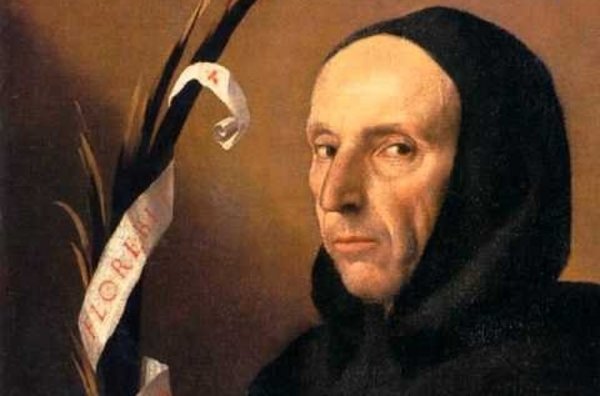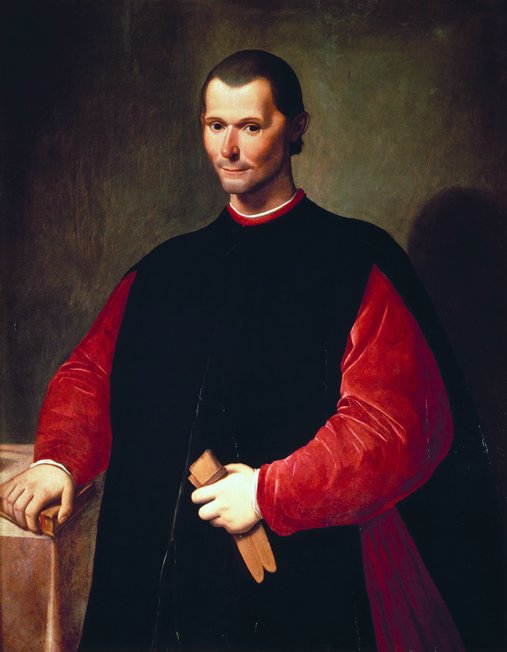After Julian's death, Lorenzo adopts his son and raises him as his own, gives him home, education and ensures a good future. The Medici were very intelligent, especially Lorenzo who had as friends many powerful men from various parts of the world. They also ally with the pope in turn and his position seems safe, even embellish Florence and be patrons of several artists of the time (Like Michelangelo) but everything changes when Lorenzo dies and a friar takes advantage of it his name was Girolamo Savonarola, the friar did not want a family to have all the power again and Lorenzo's son was expelled from the city, I will tell you in another post about the history of this friar, so soon we return to the absence of the Medici . The King of France triumphantly enters Florence and Savonarola receives him saying that he was a liberator, but Savonarola was a despot who ruled by abusing the faith of the people and was inciting the people against Pope Alexander VI (Rodrigo Borgia).
Florence had been a republic only in name, now it was de facto although ruled by Savonarola, who participated in 2 of the most famous bonfires in history, in the first burned works of art and everything he considered a luxury.
In the second, the church burned him.

Source
Well, all this is necessary to know to understand the story of Machiavelli, who although he knows young that he liked to write, is until the end of his life that is dedicated to it.
During his youth, like many young Florentines, he focused on military life, later on he dedicated himself to politics and at the age of 25 began to entrust him with more important missions.
That's why you know more about his life from this stage.
In one of these missions he is charged to go to Rome and observe the process to choose a new pope, with surprise sees how the son of the deceased Pope, Alexander VII, (Cesar Borgia) helps a former enemy of the family, Cardinal Delle Rovere to become the new Pope, in that way he hopes that the rivalry between both families will end. But when Delle Rovere becomes pope, he does not hesitate to make life impossible for the family of the former pope, including Cesare Borgia, who helped him to achieve the papal throne. Machiavelli discovers that someone who obtains power has no need to forgive his enemies.
Observing the new Pope learns more things, all that would be reflected years later in his work "The Prince" but we will get to that.
From the new Pope, Julius II, he learns that people who take risks get their fortune and women, who do not dare to do anything, stay as they are.
His diplomatic career takes him to Germany and he meets with Emperor Maximilian I who had some expansionist policies that worried in the Republic of Florence, he was a man with a longing for infinite power but after listening to Machiavelli he was speechless, in a single audience he earned his respect and thanks to his eloquence the emperor was convinced not to conquer Italian territory, so good speaker was Machiavelli, and in Florence everyone wanted to be his friend was also a very analytical man and from his trip he learned that the Germans are a great force together, for example militarily, but his policy is very weak, also describes the emperor as a weak man who detested because he let himself be convinced, not as Fernando de Aragon, a man who admired by his iron will.
Let's go back to the political environment of Florence, remember that the rival Medici family murdered Julian and his little son was educated by Lorenzo? Well, after the death of Julius II, that young man became Pope, now a Medici occupied the papal throne and that changed everything.
Since the new Pope from Rome did everything possible to ensure the return of the Medici to govern Florence and in you you Present, Machiavelli That The Criticized Them, He Saved The Work, But He Waited For The Porno To Come conspiring against the Medici, he is imprisoned and tortured. Then, we ask his friends and clients for help to all the influential people who said and believe that nobody helps them and once we surrender in disgrace they all turn their backs on him. He is in prison until the Pope grants an amnesty to many political prisoners and Machiavelli is released but as his supposed friends turn their backs he retires from political life, discovers that you have no power, his acquaintances have no relationship with him. He retired to a small property that he owned in San Casciano and there he dedicated himself to cutting down a forest of his property and befriends some workers, at night he dressed in his old luxurious clothes and civil service suit and began to read The works of Dante and Petrarca. Then one night he began to write, everything I learned watching people with power, all, success and mistakes, plasmas in his work, "The Prince", the most famous phrase that is attributed to the "The end justifies the" means, but I have never seen what Machiavelli, at least not exactly, he exposes in his work is that the acts of the princes must be judged by their results, a rather evil reasoning, which is called "amoral realism", and what it is what is best what is the same as what does not matter to reality, what your subjects create them, and that you ask yourself more about your homeland than yourself, and that you have to be willing to Go to hell and do terrible things.

Source
For example, the famous Cesare Borgia, a man who once assembled his enemies to negotiate peace, once we had one all together, ordered to kill them, Machiavelli admired that, that is "Cruelty well used used". it was for the greater good of his people. In this time, in Italy, and in large part, in Europe, many men, young people, men, women, men, women, men, women, men, women, men, women and men.
The best people according to Machiavelli, do not work with love, there are no loving relationships that work because eventually people get distorted, the best are strong laws and exemplary punishments, to form powers and responsible citizens.
Singapore would be a perfect example.
But not only had the prince, he made almost 10 works including "La Mandrágora", one of the best comedies ever written, although it has a bitter and somber upset but it is still a masterpiece, he also made a series of comments about of Tito Livio's speeches, the work he leaves in the middle to finish writing the Prince, which was published in a manual of advice for tyrants, in fact Mussolini loved that work, and he read it constantly.
The prince was his attempt to gain sympathy and return to public life, but at age 52 he received an amnesty and his life improved a little, but then I falsely accused him of conspiring against the Medici, and he was tortured and imprisoned again.
When he left, he helped a merchants' union to release some kidnapped workers and in gratitude received a large amount of money, with that money he paid debts and bought a lottery ticket that turned out to be the winner, with 20,000 ducats in the bag his life gave a great turn and even could return to the public service when they commissioned him for 120 florins, write a work on the history of Florence.
When the work was finished, something very curious happened. Do you remember that he had been imprisoned and tortured a couple of times accusing him of wanting to conspire against the Medici ?, now he was accused of being in favor of them and being a supporter of their ideas.
Machiavelli said no, and the thing did not happen to major and spent his last years working in peace at the Humanist Academy, finally died on June 22, 1527 due to a peritonitis, not knowing that his name would be synonymous with evil centuries later of his death, but Machiavelli was not right, because although there are still princes, now political leaders who abuse the hope of the people, in reality the power does not change them, it simply brings out his true personality, the darker desires of their soul and those leaders seek to divide, become fanatics who do not seek the common good, seek revenge, do not seek to do well to all, not even to them, seek to do harm to their enemies and at that time is when a town is at the mercy of a tyrant.
That is why it is important not to forget what we have in common and not what differentiates us, it is important not to let ourselves be divided, to remain united, and to stop arguing with the people we want for nonsense, to leave hatred aside and always remember that together, we are better and stronger.
End.


Witness proposal is here:
[Witness Proposal] (https://steemit.com/witness-category/@adsactly-witness/adsactly-steemit-witness-proposal)
[Go To Steem Witness Page] (https://steemit.com/~witnesses)
